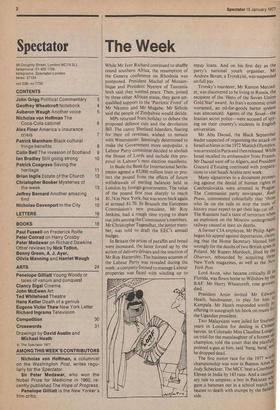The Week
While Mr Ivor Richard continued to shuffle round southern Africa, the resumption of the Geneva conference on Rhodesia was postponed. President Machel of Mozambique and President Nyerere of Tanzania both said they wanted peace. Then, joined by three other African states, they gave unqualified support to the 'Patriotic Front' of Mr Nkomo and Mr Mugabe. Mr Sithole said the people of Zimbabwe would decide.
MPs returned from holiday to debate the proposed defence cuts and the devolution Bill. The canny Shetland Islanders, fearing for their oil revenues, wished to remain with Westminster. Seemingly determined to make the Government more unpopular, a Labour Party committee decided to abolish the House of Lords and include this proposal in Labour's next election manifesto.
In Basle the Bank for International Settlements agreed a $3,000 million loan to protect the pound from the effects of future withdrawals of sterling balances held in London by foreign governments. The value of the pound first rose sharply to reach $1.74 in New York, but was soon back again at around $1.70. In Brussels the European Commission's new president, Mr Roy Jenkins, had a rough time trying to share out jobs among the Commission's members. Mr Christopher Tugendhat, the junior member, was told to draft the EEC's annual budget.
In Britain the prices of paraffin and bread were increased, the latter forced up by the action of delivery drivers and the inaction of Mr Roy Hattersley. The business acumen of the Labour Party was revealed during the week : a company formed to manage Labour properties was faced with winding up to repay loans. And on his first day as the party's national youth organiser, Mk Andrew Bevan, a Trotskyist, was suspended on full pay.
Trotsky's murderer, Mr Ramon Mercader, was discovered to be living in Russia, the recipient of the 'Hero of the Soviet Union Gold Star' award. As Iran's economic crisis worsened, an oil-for-goods barter system was announced. Agents of the Savak—the Iranian secret police—were accused of sPYing on their country's students in English universities.
Mr Abu Daoud, the Black September leader suspected of organising the attack on Israeli athletes at the 1972 Munich Olympics, was arrested in Paris and then released. While Israel recalled its ambassador from France, Mr Daoud went off to Algiers, and President Giscard d'Estaing continued with preparations to visit Saudi Arabia next week.
Many signatories to a document protesting against the denial of human rights iO Czechoslovakia were arrested in Prague. The Communist party newspaper, Rude Provo, commented colourfully that 'those who lie on the rails to stop the train of history must expect to get their legs cut or The Russians had a taste of terrorism when an explosion on the Moscow undergroutid railway caused at least six deaths.
A former CIA employee, Mr Philip Agee' began his appeal against deportation, daily' ing that the Home Secretary blamed MO wrongly for the deaths of two British spies in Poland. Mr Rupert Murdoch, jilted by the Observer, rebounded by acquiring three New 'York magazines, as well as the New York Post.
Lord Avon, who became critically ill io Florida, was flown home to Wiltshire by the RAF. Mr Harry Wheatcroft, rose grower' died. President Amin invited Mr Edwarri Heath, bandmaster, to play for him Kampala. Mr Heath responded wittily hY offering to autograph his book on music for the Ugandan president. Two Malaysians were jailed for fourteen years in London for dealing in Chinese heroin. In Colorado Miss Claudine Longeti on trial for the manslaughter of a former champion, told the court that she playfil pointed a gun at him, said 'bang, bang' arl
he dropped dead.
The first motor race for the 1977 w'a
championship was won in Buenos Aires 1/), Jody Scheckter. The MCC beat a Combine° Eleven in India by 143 runs. And a cautiori; ary tale to umpires: a boy in Pakistan gave a batsman out in a school match wn: beaten to death with stumps by the fieldire side. ,


































 Previous page
Previous page